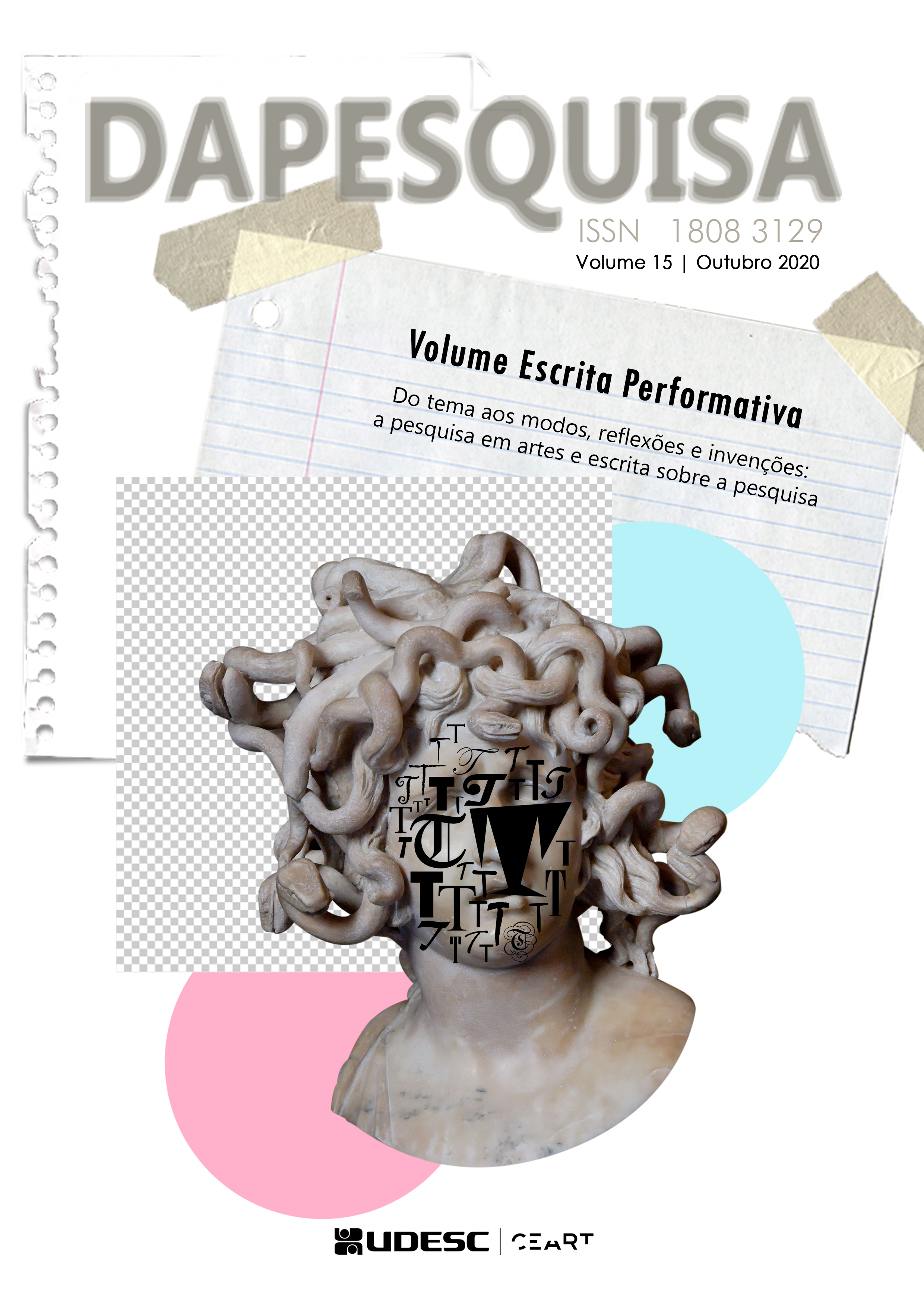A casa que habito a casa que habita em mim
DOI:
https://doi.org/10.5965/1808312915252020e0025Palavras-chave:
Artes cênicas e crianças, Linguagem corporal na arte, Brincadeiras na arte, Performance (Arte)Resumo
Este texto refere-se ao trabalho desenvolvido com crianças pequenas numa instituição de
Educação Infantil. O trabalho cotidiano com as crianças se inspira em movimentos que
compõem Invenções Brincantes/Artísticas. Na combinação de elementos advindos da
psicomotricidade, principalmente na perspectiva dos autores franceses Bernard Aucouturier e Andre Lapierre; e outros da arte, tendo por referência artistas como Lygia Clark, Elisa Bracher, Hélio Oiticica, Amélia Toledo, Deborah Colker, Leandro Selister, brotam as Invenções
Brincantes/Artísticas. O trabalho é pensado e tramado oportunizando que as crianças
brinquem com a arte, com os artistas, com as obras, com as proposições, com os materiais e
com as técnicas. Espaços e tempos de brincadeira nos quais as crianças criam. Um dos
intuitos das Invenções Brincantes/Artísticas é o de permitir que o corpo infantil sobrevenha,
priorizando um espaço-tempo nas rotinas escolares para um trabalho de cunho corporalartístico. O corpo-arte instigando o desejo infantil de experimentar e de conhecer, um espaçotempo para manifestação do que pode um corpo infantil. No início do ano de 2017, uma dupla de professoras define A CASA como alusão para o trabalho com as crianças no decorrer daquele ano. A CASA foi, portanto, o elemento que nutriu a poesia e o pensamento sobre as coisas do mundo. A arte contemporânea em diálogo com a linguagem performática, o teatro, o cinema, a dança e a literatura deram subsídios para a reflexão sobre corpo e infância no espaço escola.
Downloads
Referências
ATTAR, Farid al-Din. A linguagem dos pássaros. São Paulo: Attar Editorial, 2011.
BACHELARD, G. A Poética do Espaço. São Paulo: Martins Fontes, 1989.
BENJAMIN, W. Reflexões sobre a criança, o brinquedo e a educação. São Paulo: Editora 34, 2009.
BRACHER, E.; VALENTIM, F.; NAVES, R. A cidade e suas margens. São Paulo: Editora 34, 2008.
CASA. Criação, Direção e Coreografia: Deborah Colker. Rio de Janeiro: Dan Hassan, 1999. 1 DVD (60 min.), son., color.
A CASA. Intérprete: Boca Livre. In: A Arca de Noé, [S. l..]: Gravadora Ariola , 1980. 1 disco sonoro, faixa 2, lado 2 (2 min., 13 sec.). Disponível em: http://www.toquinho.com.br/album/lp-a-arca-de-noe-1-polygram-1980/. Acesso em: 3 mar. 2020
A CASA é sua. Intérpretes: Arnaldo Antunes/Ortinho. In: Ao vivo lá em casa. Intérprete: Arnaldo Antunes. [S. l.] : Gravadora Rosa Celeste, 2010. 1 CD, faixa 1( 4 min., 41 sec.) Disponível em: https://open.spotify.com/track/0QjxHLuEJHmAFDyMkEDf7z. Acesso em: 08 mar. 2020.
CASA é Sua - Arnaldo Antunes: videoclipe oficial (Projeto 3 Clipes - 1 Curta) . Publicado on-line pelo canal Três Clipes. Disponível em: https://www.youtube.com/watch?v=Y-xVpQ1KRWw. Acesso em: 20 fev. de 2020.
CHIARELLI, T. Leda Catunda. São Paulo: Cosac & Naify Edições, 1998.
COLKER, D.; BOSCO, F.; ELIAS, J. Companhia de dança Deborah Colker. Rio de Janeiro: Réptil, 2013.
DOGVILLE. Direção: Lars Von Trier. Dinamarca: California Filmes, 2003. 1 DVD (171 min.), son., color. Legendado.
EM BUSCA do ouro. Direção : Charles Spencer Chaplin. Produção de United Artists. Estados Unidos: Charlie Chaplin Film Corporation, 1925. 1 DVD (96 min.) P&B.
ERNESTO NETO. São Paulo: Itaú Cultural, 2020. Website: Enciclopédia Itaú Cultural de Arte e Cultura Brasileiras. Disponível em: https://enciclopedia.itaucultural.org.br/pessoa11848/ernesto-neto. Acesso em: 19 abr. 2020.
LALAU; LAURABEATRIZ. Passarinhos do Brasil: poemas que voam. São Paulo: Peirópolis, 2013.
LALAU; LAURABEATRIZ. Sobre Voos: o que as aves brasileiras veem lá de cima. São Paulo: Editora Manole, 2008.
LOVE Casa Batlló. Barcelona: Vimeo, 2013. 1 vídeo (2 min., 34 sec.) son. color. Disponível em: https://vimeo.com/81086090. Acesso em: 3 mar. 2020.
MARQUES, A. M.; JORGE, E. Como se fosse a casa: (uma correspondência). Belo Horizonte: Relicário Edições, 2017.
MELLO, R. Meninos do Mangue. São Paulo: Companhia das Letrinhas, 2001.
MELLO, R. Clarice. São Paulo: Global, 2018.
MELLO, R. Vizinho, Vizinha. São Paulo: Companhia das Letrinhas, 2002.
PÁEZ VILARÓ, C. Museo-Taller de Casapueblo (Uruguai). Uruguai : Casapueblo, 2015. Facebook: @museotallerdecasapueblo. Disponível em: https://www.facebook.com/museotallerdecasapueblo/. Acesso em: 03 mar. 2020.
PATRICK Dougherty. Publicado on-line pelo site Patrick Doucherty, News , Carolina do Norte : [s . n.], 2015. Disponível em: http://www.stickwork.net/news. Acesso em: 03 mar. 2020.
PINACOTECA DO ESTADO DE SÃO PAULO. Lygia Clark da obra ao acontecimento: somos o molde : a você cabe o sopro. [Catálogo]. Curadoria: Suely Rolnik; Corinne Diserens. São Paulo: Pinacoteca do Estado de São Paulo, Organização Social de Cultura, 2005.
QUINTANA, M. Preparativos de Viagem. Rio de Janeiro: Alfaguara, 2013.
RESTANY, P. Hundertwasser: o pintor das cinco peles. Lisboa: Taschen, 2003.
SELISTER, L. Leandro Selister: paixão por capturar imagens que marquem a passagem do tempo. [S. l] : Dana. Website: Dana, entrevistas. Disponível em: https://dana.com.br/social/entrevistas/leandro-selister/. Acesso em: 03 mar. 2020.
SELISTER, L. Tique-taque tremor das pequenas coisas. Porto Alegre: Escritos, 2014.
SELISTER, L. Tique-Taque, tremor das pequenas coisas. [S. l. : s. n.], 2004. Blog: Leandro Selister, projetos. Disponível em: https://www.leandroselister.com.br/blog/portfolio-item/tique-taque-tremor-das-pequenas-coisas/. Acesso em: 03 mar. 2020.
SÍS, P. A Conferência dos Pássaros. São Paulo: Companhia das Letrinhas, 2013.
TOLEDO, A. Amélia Toledo: arte, liberdade, aventura. [S. l. : s. n.], 2017. Website: Amélia Toledo Disponível em: https://ameliatoledo.com/artista/. Acesso em: 3 mar. 2020.
Publicado
Como Citar
Edição
Seção
Licença
Copyright (c) 2020 Lígia Mara Santos

Este trabalho está licenciado sob uma licença Creative Commons Attribution 4.0 International License.
Autores que publicam nesta revista concordam com os seguintes termos:
Autores mantém os direitos autorais e concedem à revista o direito de primeira publicação, com o trabalho simultaneamente licenciado sob a Licença Creative Commons Atribuição 4.0 Internacional, a qual permite que outros distribuam, remixem, adaptem e criem a partir do seu trabalho, mesmo para fins comerciais, desde que lhe atribuam o devido crédito pela criação original, reconhecendo a autoria e publicação inicial nesta revista.
A DAPesquisa, segue as recomendações do movimento de Acesso Aberto, proporciona acesso público a todo seu conteúdo, a partir do princípio de que tornar gratuito o acesso a pesquisas gera um maior intercâmbio global de conhecimento.
Plágio, em todas as suas formas, constitui um comportamento antiético de publicação e é inaceitável. A revista DAPesquisa utiliza o software iThenticate de controle de similaridade.





